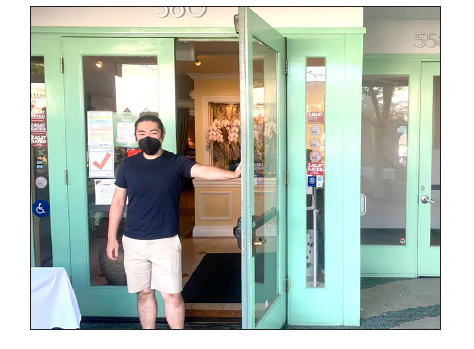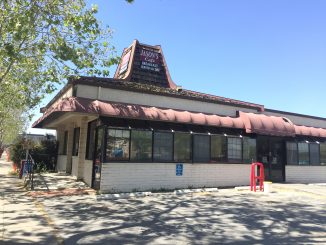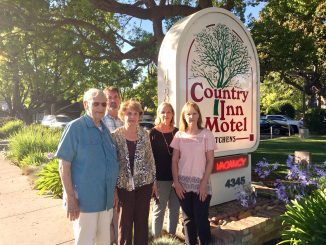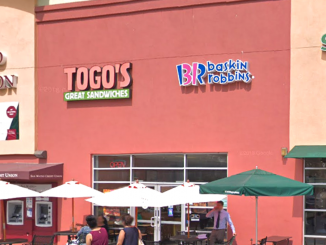
This story was originally published in the print edition of the Daily Post on June 7. Often our competitors will rewrite the Post’s stories and serve them up as if they had done some original reporting. Rewriting isn’t reporting. Here’s the original.
BY BRADEN CARTWRIGHT
Daily Post Staff Writer
Palo Alto business owners are organizing against a law firm that has used the Americans with Disabilities Act to win thousands of lawsuits and millions of dollars from businesses across the state.
Leaders of the Bay Area Small Business Coalition say they’ve found an honest and affordable lawyer to defend their 50 members against the law firm Potter Handy, and he has already won small victories.
The coalition is also lobbying for a state bill that would make ADA lawsuits harder to file.
“With the pandemic, with everything the restaurants were going through, I think everybody was like, ‘This is just too much,’” said Stephanie Wansek, the owner of Maxine Bistro at 548 Ramona St.
Wansek and Tai Pan owner Tony Han said in an interview yesterday that they started talking in 2021, after they were both sued by Scott Johnson, a wheelchair-bound attorney represented by Potter Handy. Potter Handy’s lawsuits follow a similar pattern. Johnson or another plaintiff claims he or she visited a business, and it wasn’t accessible for several reasons. Restaurants have been sued the most.
Usually, letters from law firms on the other side arrive in the mail around the same time, with promises to save the business money.
Johnson’s lawsuits in the summer of 2021 focused on outdoor dining tables that didn’t have enough room for his knees or toes, and he hit dozens of restaurants along University Avenue.
Potter Handy has also sued businesses up and down El Camino Real, on Castro Street in Mountain View and Laurel Street in San Carlos.
Tax evasion
In April, Johnson was sentenced for tax evasion to 30 months of house arrest, and he was banned from suing businesses in that time. But Potter Handy remains active.
Most of these lawsuits are settled for around $10,000, but Han and Wansek wanted to fight back, both for their own finances and out of principle.
“One of our biggest messages was to tell people that they are not alone. And throughout this whole thing, the sense of community was really profound …. People feel the need to share the struggle,” Han said.
That was evident during a hearing on Senate Bill 585, which would give businesses 120 days to fix their ADA violations before a lawsuit can be filed. During the hearing, in which the public can call to support or oppose a bill, call after call was from small business owners supporting SB585, and it was sent to the Assembly on a 29-7 vote, said Han, who drove to Sacramento to speak in support.
“It was quite impressive,” Wansek said.
Similar bills haven’t passed because lawmakers have seen them as against people with disabilities, but this bill only targets serial plaintiffs, Wansek said.
To form the business coalition, Han and Wansek tracked a website that showed where lawsuits were being filed, and they reached out to those businesses, sometimes with a knock on the door.
Most members are located in between Los Gatos and San Mateo, and about a dozen are from Palo Alto, Han said.
The group hired Phillip Tillman, who charges $2,500 per business, to fight their lawsuits.
Tillman said he wanted at least 10 businesses to share costs.
“You can only do this if you have numbers,” Wansek said.
Potter Handy would settle for $5,000
During a settlement conference, Potter Handy offered around $5,000 to settle, Wansek said.
All but one business said no, and the cases ended up being dismissed by a federal judge, with the option for Potter Handy to sue again in state court.
Potter Handy has re-sued about 10 businesses in the coalition so far, and they are getting read for more, Han said.
Wansek said she is hoping the case reaches a point where Johnson testifies under oath, that way Tillman can ask him about whether he actually intended to go to the business.
These are questions “we all know the answers to,” Wansek said.
“The court needs to understand that something is wrong,” she said.
The ADA is a building code signed in 1990 that requires at least 5% of seating to be accessible for people with disabilities. The code is enforced by private citizens, and in California, it is enforced primarily by a few specialized law firms that represent a small section of the disabled community.




I think i’ve read that Scott Johnson often won’t get out of his car to make a complaint. He’ll drive by to get addresses and business names, and then go home and churn out the extortion letters businesses get.
Oh. It’s disheartening to hear about the misuse of the ADA by law firms like Potter Handy, who have profited from numerous lawsuits against businesses. … [Portion deleted, terms of service violation] The impact of these lawsuits on businesses, particularly during the pandemic, has been overwhelming, and it’s crucial for the community to come together and support each other.
“That was evident during a hearing on Senate Bill 585, which would give businesses 120 days to fix their ADA violations before a lawsuit can be filed.”
This is a good solution. (1) People with disabilities get accommodated (2) businesses can comply without the additional expense of legal fees and lawsuits, and best of all (3) lawyers get shafted
This is the sort of result you end up with when you legislate on the basis of emotion and “feel goodism”.